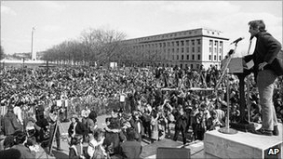
The publication comes 40 years after parts were leaked to the New York Times, showing that the administration at the time had lied to the public.
The National Archives formally released all 7,000 pages on Monday.
Daniel Ellsberg, chief defendant in the Pentagon Papers case, at an anti-Vietnam War rally in Pennsylvania on 1 April 1972. Daniel Ellsberg, chief defendant in the Pentagon Papers case, at an anti-Vietnam War rally in 1972
President Richard Nixon's attempts to block the publication led to a landmark court ruling that gave the media more power to investigate public officials.
The move to publish the so-called Pentagon Papers has caused a flurry of speculation over what may be left to discover about a war that divided the nation.
And many are questioning why it took so long to officially unveil one of history's worst-kept secrets.
In 1967, President Lyndon Johnson commissioned a report on Vietnam at a time when much of the US had turned against the war.
In 1971, when President Nixon was in the White House, a whistleblower leaked some of the most contentious passages to the New York Times.
They revealed the Johnson administration had secretly escalated the conflict and lied to Congress about its actions.
President Nixon failed to block the publication and, since then, most of the Pentagon Papers have been published - even though they remained classified documents.
By Jane O'Brien
BBC News, Washington






